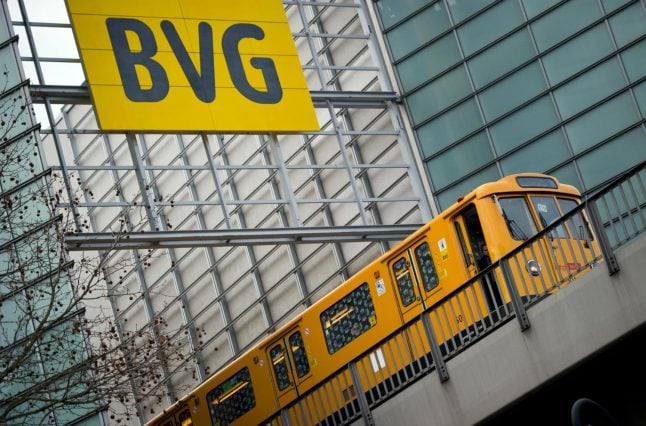Passengers who use the U-Bahn (subway), trams or buses will have to find other means of transport while the industrial action is underway.
The powerful Verdi trade union called on its members to down their tools and walk out as part of a so-called ‘warning strike’, which is due to start in the early morning and last until around noon. It will affect all 'Berliner Verkehrsbetriebe' (BVG) operations – subways, trams and buses.
SEE ALSO: Berlin attorney general wants to scrap criminal penalties for fare evasion
The dispute is over pay and conditions.
“The capital's public transport system is expected to be severely hampered,” a spokesperson from Verdi said on Monday, reported the Berliner Zeitung.
And more strikes by BVG workers are likely.
“If employers stick to their blockade stance, further industrial action is likely,” Verdi secretary Jeremy Arndt said. The next warning strikes would last longer than half a day, as is planned for February 15th.
Strikes are part of industrial action wave in Germany
The strikes are the latest in a long line of industrial action in Germany that shows how powerful unions are in the Bundesrepublik. The action has included security staff and ground staff walking out of airports across the country in separate disputes, which have caused a huge amount of disruption.
SEE ALSO: Düsseldorf airport strikes Thursday, causing 56 cancelled flights
SEE ALSO: Dozens of flights cancelled in Hamburg as ground staff strike
In the capital, a strike by public sector workers is also planned for Wednesday, which will hit Kitas (nursery schools/day care centres) particularly hard.
The German Education Union (GEW), Verdi, the police union (GdP) and the building and facility management union, IG Bau, have all called for state employees to go on a full-day ‘warning strike’ on Wednesday.
Many day care centres or Kitas will be closed or only offer partial care, and parents have been urged to check in case they need to find alternative care arrangements. It comes after a strike by Kita employees took place at the end of last month.
The action is connected to collective bargaining between bosses and unions for employees in the public sector, which is currently underway.
The unions are demanding a six percent pay rise for employees, or at least €200 extra per month. In addition, there is a dispute about nursery teachers in Berlin earning significantly less than in other states due to them being classed in a different category.
SEE ALSO: Thousands of families affected as Berlin Kitas set for strike
Week day strike more effective
For BVG, the last work stoppage took place more than six years ago and brought the city to a standstill. “In 2012 there was a warning strike on a Saturday,” said Verdi secretary Arndt.
However, the union wants the strike to take place on a weekday to have more impact. “At the weekend, industrial action generates less pressure,” Arndt added.
In the interest of public transport users, however, it has been decided to announce the warning strike four days in advance.
Whether the BVG has enough time to organize emergency cover was left open on Monday. “That would be very difficult,” a BVG spokesperson said.
SEE ALSO: How riding Germany's local transport helps you get under a city's skin
There are some other options for customers. S-Bahn trains are not affected as they belong to the operator Deutsche Bahn. Regional trains are also not operated by BVG, so passengers can switch to these means of transport. Nevertheless, the warning strike will tear a large gap into the transport network.
With 1.1 billion passengers, the BVG carried more than twice as many passengers as the S-Bahn last year alone. Furtherore, many S-Bahn lines are already overloaded so when BVG customers pack onto trains Friday, it could get very crowded.
'No alternative'
But the Verdi union sees no alternative. After the first round of negotiations on January 28th, the union was still optimistic, but after the second, almost three-hour meeting on Monday, its outlook was more negative.
“We had hoped that the employers would submit an offer,” said Arndt. “The fact that nothing came at all surprised us.”
Verdi demands that the weekly working time for employees who joined the BVG after 2005 be reduced from 39 to 36.5 hours – with full wage compensation.
This would require 500 additional employees, said Claudia Pfeiffer, managing director of the local employers' association (KAV).
The negotiations on the new collective agreement for the 14,500 employees are also about a fairer classification in the wage and salary table. The Christmas bonus of currently €1,400, which is only paid out after one year of being an employee, should also be paid earlier, according to the union.
The trade union has also demanded a one-off payment of €500 from the BVG for its members. The bottom line is that all the improvements demanded would increase the BVG's annual personnel costs (most recently around €570 million) by €60 million, according to Verdi.
But politicians have warned that money is limited – and raised concerns about the amount of strikes taking place in Berlin.
“Not only is the capital not working in many areas, but now there are also monthly warning strikes,” said Florian Swyter of the pro-business Free Democrats (FDP), although he added it was “absolutely understandable” that the workers wanted to make themselves heard.
The next round of negotiations for BVG will continue on March 5th. For the collective bargaining in the public sector, negotiations will take place at the end of February.



 Please whitelist us to continue reading.
Please whitelist us to continue reading.
Member comments